- Home
- Il festival
- Archivio
- PKF 2016
PKF 2016
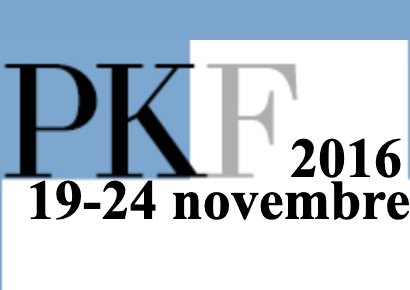 Undicesima edizione del festival. Dal Panorama sul nuovo cinema israeliano ai Percorsi ebraici, attraversando una sezione speciale dedicata alla grande Ronit Elkabetz. Numerosi i lungometraggi e i documentari presentati. Tra questi, Il Ghetto di Venezia – 500 anni di vita, di Emanuela Giordano, che ripercorre, anche grazie a inserti di ricostruzione storica realizzati in animazione, le vicende del ghetto più antico d’Europa e ricorrendo inoltre ai ricordi e alle testimonianze di “testimoni eccellenti”, tra cui Amos Luzzatto e Riccardo Calimani. Si andrà alla scoperta della vita quotidiana e della tradizione, così come delle sinagoghe nascoste e dell’antico cimitero ebraico. Quindi, Mr. GAGA anima e corpo di un genio della danza, di Tomer Heymann, la storia di Ohad Naharin, nato e cresciuto in un kibbutz, uno dei coreografi più importanti e innovativi al mondo, conosciuto a livello internazionale per aver creato il linguaggio di movimento corporeo chiamato “Gaga”.
Undicesima edizione del festival. Dal Panorama sul nuovo cinema israeliano ai Percorsi ebraici, attraversando una sezione speciale dedicata alla grande Ronit Elkabetz. Numerosi i lungometraggi e i documentari presentati. Tra questi, Il Ghetto di Venezia – 500 anni di vita, di Emanuela Giordano, che ripercorre, anche grazie a inserti di ricostruzione storica realizzati in animazione, le vicende del ghetto più antico d’Europa e ricorrendo inoltre ai ricordi e alle testimonianze di “testimoni eccellenti”, tra cui Amos Luzzatto e Riccardo Calimani. Si andrà alla scoperta della vita quotidiana e della tradizione, così come delle sinagoghe nascoste e dell’antico cimitero ebraico. Quindi, Mr. GAGA anima e corpo di un genio della danza, di Tomer Heymann, la storia di Ohad Naharin, nato e cresciuto in un kibbutz, uno dei coreografi più importanti e innovativi al mondo, conosciuto a livello internazionale per aver creato il linguaggio di movimento corporeo chiamato “Gaga”.
Altro titolo del festival, Presenting Princess Shaw, di Ido Haar, la storia di Samantha Montgomery, cantautrice americana dal passato difficile, dotata di una splendida voce e di un enorme talento compositivo, che su un canale YouTube, con il nome di Princess Shaw, posta confessioni personali e performance musicali. Il regista Ido Haar sa che, dall’altra parte del mondo, il bizzarro Kutiman, musicista israeliano e “mashup artist” di successo, vuole utilizzare la voce di Princess Shaw in uno dei suoi video virali per il progetto Thru You.
Direzione artistica PKF
 Co-direttore dalla seconda edizione del Roma Kolno’a Festival (2007) e ininterrottamente dalla prima del PKF (2008), Dan Muggia è stato un attore e produttore, oggi è critico cinematografico, insegnante e curatore. Con una laurea alla Beit-Zvi Drama School, e un master in cinema alla New York University (e diplomato alla Mandel School for Educational Leadership), Fino al 2004 ha lavorato alla Israel Film Service. Nel 2003 ha pubblicato il suo primo libro: 100 Film Masterpieces. Ha prodotto il documentario “Naomi’s Corset” di Gerard Allon’s, che ha riscosso successo in vari festival (tra cui il Jerusalem Film Festival). E’ stato managing producer del South Film Festival 2005 di Sderot e membro della giuria al Docaviv International competition, al Jewish Experience competition del Jerusalem film Festival. Oggi Dan insegna cinema in Israele, al Sapir College e alla Beit Berl Art School ed è stato appena nominato Capo dipartimento Cinema, Facoltà delle Arti, Beit Berl College (ott. 2015). E’ Commendatore dell’Ordine della Stella d’Italia (2009) e, dal 2014 è Direttore insieme a Ronny Fellus di Cinema Italia – festival del cinema italiano in Israele.
Co-direttore dalla seconda edizione del Roma Kolno’a Festival (2007) e ininterrottamente dalla prima del PKF (2008), Dan Muggia è stato un attore e produttore, oggi è critico cinematografico, insegnante e curatore. Con una laurea alla Beit-Zvi Drama School, e un master in cinema alla New York University (e diplomato alla Mandel School for Educational Leadership), Fino al 2004 ha lavorato alla Israel Film Service. Nel 2003 ha pubblicato il suo primo libro: 100 Film Masterpieces. Ha prodotto il documentario “Naomi’s Corset” di Gerard Allon’s, che ha riscosso successo in vari festival (tra cui il Jerusalem Film Festival). E’ stato managing producer del South Film Festival 2005 di Sderot e membro della giuria al Docaviv International competition, al Jewish Experience competition del Jerusalem film Festival. Oggi Dan insegna cinema in Israele, al Sapir College e alla Beit Berl Art School ed è stato appena nominato Capo dipartimento Cinema, Facoltà delle Arti, Beit Berl College (ott. 2015). E’ Commendatore dell’Ordine della Stella d’Italia (2009) e, dal 2014 è Direttore insieme a Ronny Fellus di Cinema Italia – festival del cinema italiano in Israele.
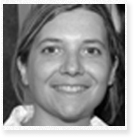 In co-direzione già dalla prima edizione del Roma Kolno’a Festival (2006) e poi ininterrottamente al PKF, Ariela Piattelli è nata a Roma, dove ha studiato al DAMS di RomaTre e si è laureata in Storia e critica del cinema. Oggi è giornalista e collabora con « Il Corriere della Sera ». In passato ha collaborato per alcune testate, tra cui « Il Giornale », l’agenzia Apcom (al desk di New York) e la rivista di cultura ebraica « Shalom » di cui è ancora redattrice. Nel corso degli anni ha approfondito gli studi sul rapporto tra arti figurative ed ebraismo e, nei suoi numerosi viaggi in Israele è venuta a contatto con il cinema israeliano. Dal 1998 è consulente dell’Ambasciata d’Israele in Italia per iniziative culturali e festival cinematografici. E’ stata membro della giuria al Jerusalem Film Festival 2008 (per la sezione “Jewish Experience”) ed è curatrice insieme a Raffaella Spizzichino e Shulim Vogelmann, del Festival Internazionale di Letteratura Ebraica. Nell’ultimo anno ha prodotto alcuni eventi culturali tra Italia e Israele, tra cui il concerto di Idan Raichel Project a Roma (Piazza del Campidoglio, in collaborazione con Zètema) e l’anteprima italiana di “Seven Days” di Ronit e Shlomi Elkabetz, nell’ambito del Festival Internazionale del Film di Roma.
In co-direzione già dalla prima edizione del Roma Kolno’a Festival (2006) e poi ininterrottamente al PKF, Ariela Piattelli è nata a Roma, dove ha studiato al DAMS di RomaTre e si è laureata in Storia e critica del cinema. Oggi è giornalista e collabora con « Il Corriere della Sera ». In passato ha collaborato per alcune testate, tra cui « Il Giornale », l’agenzia Apcom (al desk di New York) e la rivista di cultura ebraica « Shalom » di cui è ancora redattrice. Nel corso degli anni ha approfondito gli studi sul rapporto tra arti figurative ed ebraismo e, nei suoi numerosi viaggi in Israele è venuta a contatto con il cinema israeliano. Dal 1998 è consulente dell’Ambasciata d’Israele in Italia per iniziative culturali e festival cinematografici. E’ stata membro della giuria al Jerusalem Film Festival 2008 (per la sezione “Jewish Experience”) ed è curatrice insieme a Raffaella Spizzichino e Shulim Vogelmann, del Festival Internazionale di Letteratura Ebraica. Nell’ultimo anno ha prodotto alcuni eventi culturali tra Italia e Israele, tra cui il concerto di Idan Raichel Project a Roma (Piazza del Campidoglio, in collaborazione con Zètema) e l’anteprima italiana di “Seven Days” di Ronit e Shlomi Elkabetz, nell’ambito del Festival Internazionale del Film di Roma.
Ospiti PKF 2016
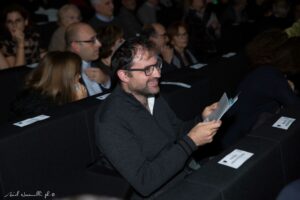 Emanuel Cohn
Emanuel Cohn
Emanuel Cohn è nato e cresciuto a Basilea, in Svizzera. Dopo il liceo si è trasferito in Israele, dove ha studiato alla scuola religiosa Yeshivat Har Etzion e dove ha servito l’esercito. Dopo aver conseguito un master in filosofia ebraica all’università di Bar Ilan, Emanuel ha studiato recitazione al Visual Theatre e sceneggiatura alla Ma’ale Film School di Gerusalemme. Il piccolo dittatore, presentato al PKF, sancisce la sua prima collaborazione con la sorella Nurith Cohn, regista del cortometraggio.
Emanuel Cohn was born and raised in Basel, Switzerland. After high school, he moved to Israel where he studied at the religious school Yeshivat Har Etzion and served in the army. Emanuel then completed a Masters in Jewish philosophy at Bar Ilan University, going on to study acting at the School of Visual Theatre and scriptwriting at the Ma’aleh Film School, both in Jerusalem. The Little Dictator, presented at PKF, is his first collaboration with his sister, Nurith Cohn, who directed the short film.
 Evgenia Dodina
Evgenia Dodina
Dopo essersi diplomata al GITIS, Royal Art School a Mosca e dopo aver recitato al Teatro Maiakoski a Mosca, Evgenia si è trasferita in Israele e ha iniziato a collaborare con il Teatro Gesher di Tel Aviv. Da subito ha catturato l’attenzione e colpito positivamente la critica. Dal 2007 Evgenia Dodina è attrice al Teatro Nazionale Habima di Tel Aviv. Nel 2001/2002 e l’anno successivo è stata premiata agli Israeli Theater Awards. Nel 2011 è premiata come Miglior Attrice protagonista al Haifa International Film Festival per il suo ruolo nel film Invisible di Michal Aviad.
After graduating from the Russian State Institute of Theatre Arts (GITIS) in Moscow and performing at the Moscow Mayakovsky Theater, Evgenia moved to Israel and started working with the Gesher Theater in Tel Aviv. She immediately attracted attention and the appreciation of the critics. Since 2007, Evgenia Dodina has acted at the Habima National Theatre of Israel in Tel Aviv. Both in 2001/2002 and 2002/3, she picked up Israeli Theater Awards for her acting. In 2011, she won the Best Actress prize at the Haifa International Film Festival for her role in the film Invisible, by Michal Aviad.
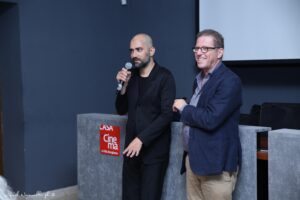 Shlomi Elkabetz
Shlomi Elkabetz
Produttore, regista e sceneggiatore, Shlomi Elkabetz è anche a capo del Dipartimento di Cinema alla Scuola di Cinema e Televisione del Sapir College. Dirige inoltre la sede israeliana del Festival des 3 Continents | Produire au Sud, ed è il proprietario della casa produzione DBGfilms. La sua filmografia include To Take a Wife, sceneggiatura e co-regia con Ronit Elkabetz (Premio Isvema, Settimana Internazionale della Critica al Festival di Venezia del 2004), Seven Days, sceneggiatura e co-regia con Ronit Elkabetz(film d’apertura della Settimana della Critica a Cannes, e pluripremiato al Valencia IFF, 2008), RUN 4TH (fiction di 15 episodi del 2009), Testimony, sceneggiatura e regia (Festival di Venezia 2011), Viviane, sceneggiatura e co-regia con Ronit Elkabetz (Festival di Cannes 2014,nominato al Golden Globe Award 2015 come Miglior film straniero).Ultimamente ha prodotto Bar Bahar-In Between, film di Maysaloun Hamoud (vincitore del Premio Miglior film d’esordio, Haifa 2016).
He is a producer, director and writer. He serves as Head of the film studies department at the Sapir Film School, leads the Israeli branch of the Festival des 3 Continents | Produire au Sud and manages his own production company, DBGfilms. His filmography includes: To Take a Wife, which he wrote and co-directed with Ronit Elkabetz (winner of the Isvema prize at International Critics’ Week in Venice, 2004); 7 Dayswritten and co-directed with Ronit Elkabetz(the opening film at Critics’ Week in Cannes, winning multiple awards at Valencia IFF, 2008); Run 4TH (a 15-part TV drama, 2009); writer and director for Testimony(Venice, 2011); and Vivian, as writer and co-director withRonit Elkabetz (Cannes, 2014,nominated for Best Foreign Film at theGolden Globe Awards,2015). Recently, he produced In Between, the first film by Maysaloun Hamoud (winner of Best Debut Feature at Haifa, 2016).
 Emanuela Giordano
Emanuela Giordano
Gli studi universitari, con indirizzo cinema e teatro, l’Accademia Nazionale D’arte Drammatica, i numerosi corsi al Centro Sperimentale di Cinematografia e di sceneggiatura americana, il corso universitario di scrittura scenica con Eduardo De Filippo le hanno permesso di sviluppare un doppio percorso professionale indirizzato alla scrittura scenica e alla regia. Il tema della Shoah e della storia ebraica ha segnato e ispirato i suoi primi progetti filmici. Il suo primo cortometraggio Appunti di questi giorni 1943 1944 sul rastrellamento degli ebrei a Roma, ha ottenuto il Premio Sacher e il premio del Cinema della Resistenza. Il medio metraggio Le ragazze del Ponte, sempre legato al tema dell’occupazione nazista, è stato presentato e premiato nell’ambito di ‘900 Donna. Al PKF la Giordano presenterà Il Ghetto di Venezia, 500 anni di vita.
She studied cinema and theatre at university and then attended Italy’s National Academy of Dramatic Arts. She studied numerous courses at the Centro Sperimentale di Cinematografia, American screenwriting training and a university course in stage writing given by Eduardo De Filippo. This background has enabled her to create a twin-track career, writing plays and directing. The Holocaust and Jewish history provided the inspiration for her early film projects. Her first short film, Appunti di questi giorni 1943 1944 about the roundup of Jews in Rome, won the Sacher prize and the Cinema della Resistenza Award. Her medium-length film Le ragazze del Ponte, again linked to the Nazi occupation, was shown at the ‘900 Donna event, where it picked up a prize. At PKF, Emanuela Giordano will present The Venice Ghetto, 500 Years of Life.
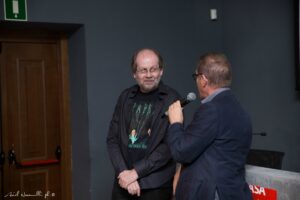 Pinchas (Pini) Schatz
Pinchas (Pini) Schatz
Pini Schatz si è laureato nel dipartimento di Cinema e Televisione dell’università di Tel Aviv. Article 58/4, il suo primo film, è stato nominato agli “Israeli Film Academy Awards” nel 1996. Il suo secondo film, The Liquid of Life, ha vinto nel 2010 il “Documentary Filmaward” al New York Independent Film Festival.Il suo terzo film Never Turn Your Back on Sparks è stato proiettato in prima internazionale al Haifa Film Festival. Pini Schatz è il direttore della programmazione della Cineteca di Tel Aviv
Pini Schatz graduated from the Cinema and Television department of the Tel Aviv university. His first film, Article 58/4, was nominated for the Israeli Film Academy Awards in 1996. In 2010, his second work, The Liquid of Life was judged the “Best International Documentary” at the New York Independent Film & Video Festival. His third picture, Never Turn Your Back on Sparks premiered at the Haifa Film Festival. Pini Schatz is the head of programming at Tel Aviv’s Cinematheque.
Percorsi Ebraici
Una donna musulmana che si distingue per essere un modello di lavoratrice provetta, un ebreo sempre sorridente e un giovane arabo cristiano. Questi sono i tre personaggi principali di Hummus. Tutti e tre condividono una forte passione per l’hummus, la salsa a base di ceci che campeggia sulla scena, proposta in varie ricette, per tutta la durata del film. La storia, passando per luoghi e città diverse, incrociando esperienze eterogenee ma tutte legate al celebre e gustoso piatto della cucina mediorientale, rivela un aspetto ulteriore di questa pietanza: la capacità di unire, almeno sotto l’aspetto culinario, chi è diviso su questioni di altro tipo, come ad esempio quelle politiche o religiose.
Il film è stato presentato all’ultima edizione (2016) del Religion Today Film Festival di Trento.
A hard-working Muslim woman, an ever-smiling Jewish man and a young Christian Arab. These are the three main characters in Hummus! The Movie. In spite of their different backgrounds, they all share one thing in common – a passionate love of hummus. Various recipes for this famous chickpea dip are featured in every scene of the film. The story covers a variety of places and cities, intertwining different experiences all linked to this delicious signature dish of Mediterranean cuisine. In doing so, the film reveals another aspect to hummus; the ability to unite – at least on a culinary level – people usually divided by other questions, like politics or religion.
The film was presented at the 2016 edition of the Religion Today Film Festival in Trento.
Anno: 2015
Nazione: Israele
Genere: Documentario
Durata: 70
Lingua: Ebraico
Regia: Oren Rosenfeld
Sceneggiatura: Oren Rosenfeld, Rebecca Shore, Baruch Goldberg
Montaggio: Raphael Aboulafia
Fotografia: Hanna Abu Saada, Yuval Sayag
Musica: Jonathan Bar Giora
Produzione: Michal Lee Sapir
Il figlio di Saul – Saul Fia
Hungarian Jew Saul Ausländer was deported to Auschwitz and there, was forced to work as a sonderkommando, disposing the bodies of his fellow prisoners. During his time at the concentration camp, Saul witnesses the extermination of his people unable to resist in any way, since he must transport the lifeless bodies of his people from the gas chambers to the crematoria. One day, as he is doing his duties, he finds the body of a boy who is still breathing. The Nazis discover the child is alive and kill it immediately. Saul is convinced it was his son and so refuses to carry out the usual disposal procedures, embarking on an almost impossible task: to bury the boy’s body in the presence of a rabbi. However, in order to dedicate himself to this mission, Saul will turn away from his companions’ plans for rebellion.
The film portrays the Nazi hell through the subjective experience of the protagonist, who finds his own form of resistance by giving dignity to one of the victims of the extermination. Son of Saul was first presented in Cannes, and after winning a Golden Globe, it went on to win the Oscar®for Best Foreign Language Film.Nazione: Ungheria
Genere: Lungometraggio
Durata: 107
Lingua: Ungherese
Regia: Laszlo Nemes
Sceneggiatura: Laszlo Nemes, Clara Royer
Montaggio: M ty s Erd ly
Fotografia: Matthieu Taponier
Musica: Laszlo Melis
Cast: Geza Rahrig, Levente Molnar, Urs Rechn
Produzione: Laokoon Filmgroup
Nel 2016 il Ghetto di Venezia compie cinquecento anni. Questo antico quartiere ebraico, che gode del poco invidiabile primato di aver visto il suo nome diventare sinonimo di segregazione, fu istituito dalla Serenissima. Diventato, gradualmente nei secoli, una zona di contatto tra culture, un “cortile” chiuso e rassicurante, un’area povera e abbandonata, sta ridiventando oggi, tra molte contraddizioni, una meta di pellegrinaggio turistico e religioso. Il film segue il percorso di scoperta di Lorenzo Luzzatto, un adolescente ebreo di New York che viene mandato a Venezia per conoscere le origini della famiglia materna. Il viaggio di Lorenzo dà voce ai custodi della memoria del luogo, che raccontano miti e verità della storia del ghetto.
Tra documentario e fiction, il racconto si snoda in una sovrapposizione di linguaggi narrativi, con momenti di teatro e animazione.
Il ghetto di Venezia, 500 anni di vita, offre la possibilità agli spettatori di ogni età e provenienza, di immergersi nella storia e nei misteri del ghetto più antico del mondo, passando per antiche sinagoghe, i canali, le calli e assistendo a momenti identitari, come un Bar Mitzvà e un funerale… Il film, presentato durante le celebrazioni dei cinquecento anni del ghetto di Venezia, arriva per la prima volta sul grande schermo a Roma, in occasione del PKF.
Anno: 2015
Nazione: Italia/Francia
Genere: Documentario
Durata: 55
Lingua: Italiano
Regia: Emanuela Giordano
Sceneggiatura: Emanuela Giordano, Alessandra Bonavina
Montaggio: Sara Zavarise
Fotografia: Alberto Marchiori
Musica: Gilles Alonzo
Produzione: TANGRAM FILM in coproduzione con ARSAM INTERNATIONAL e CERIGO FILMS
Il labirinto del silenzio – Im Labyrinth des Schweigens
Frankfurt, 1958. Johann Radmann, a lawyer in the public prosecutor’s office, is handling his normal caseload when one day he meets a journalist who has decided to expose the truth about Auschwitz. Almost no one knows this name and the few people who do, believe it was a “protective-custody camp”. In order to tell the truth, Johann first has to discover it, advancing into what was to all intents and purposes a labyrinth, created by the silence about what happened under Nazism, which enveloped Germany after 1945. While Johann views the continued silence as a poison, for many Germans revealing the truth would re-open wounds just starting to heal. The film describes Johann’s search for truth, which reconstructs the workings of the Nazi “death machine”. And it shows the difficulties of a country struggling to admit committing such atrocious crimes, while illustrating the understanding that to move forward one must have the courage to remember.
Labyrinth of Lieswas nominated as the German entry for Best Foreign Language Film at the 2016 Oscars®. Through Radmann’s story, the film shows German society’s progressive awareness of the crimes perpetrated by the Nazis.
Anno: 2014
Nazione: Germania
Genere: Lungometraggio
Durata: 124
Lingua: Tedesco
Regia: Giulio Ricciarelli
Sceneggiatura: Giulio Ricciarelli, Elisabeth Bartel, Amelye Siberberg
Montaggio: Andrea Mertens
Fotografia: Martin Langer, Roman Osin
Musica: Sebastian Pille, Niki Reiser
Cast: Andre Szymanski, Alexander Fehling, Friederike Becht
Produzione: Claussen Wabke Putz Filmproduktion, Naked Eye Filmproduktion
The Little Dictator – Hadictator hakatan (Il piccolo dittatore)
Yossi Kleinmann, un grigio professore di storia specializzato su leader politici dei regimi totalitari, si sente incompreso e poco stimato sia dai suoi studenti che da sua moglie, una donna dispotica. Un fine settimana, alla festa per il 90° compleanno della nonna di sua moglie, sopravvissuta alla Shoah, Yossi si trova in una situazione surreale che lo costringe a confrontarsi con se stesso e con la sua famiglia.
I fratelli Cohn hanno compiuto un’opera, che attraverso l’umorismo e il paradosso, affronta in modo originale i temi della storia e della vita. Il cortometraggio ha ottenuto vari premi, tra cui il Gran Premio “Nello spirito della Fede” all’ultima edizione del Festival Religion Today di Trento.
Yossi Kleinmann, a dull history professor and expert on the political leaders of totalitarian regimes, feels unappreciated both by his students and by his domineering wife. One weekend, at the 90th birthday party of his wife’s grandmother, a Holocaust survivor, Yossi finds himself in a surreal situation that forces him to face up to himself and his family.
The Cohn siblings have made a work that uses humour and paradox as an original approach to tackling the subjects of history and life. The short film has won various awards, including the Grand Prize “Nello spirito della Fede” at the last edition of the Religion Today Film Festival in Trento.
Anno: 2015
Nazione: Israele
Genere: Lungometraggio
Durata: 29
Lingua: Ebraico
Regia: Nurith Cohn
Sceneggiatura: Emanuel Cohn
Montaggio: Shaiya Berstein
Fotografia: Yosef Shelest
Musica: Asher Goldschmidt
Cast: Emanuel Cohn, Ruth Geller. Iris Penn
Produzione: Noam Keidar
Un appuntamento per la sposa – La’avor et Hachir
Michal ha trentadue anni e ha intrapresola strada dell’ortodossia religiosa da parecchio tempo. Sta per sposarsi quando, un mese prima del matrimonio, durante i preparativi, il futuro sposo le confessa di non essere innamorato di lei. Michalnon è disposta a rinunciare al suo progetto di vita coniugale, nonostante dopo la notizia ricevuta sembri ormai impossibile da realizzare. Anzi, riesce a interpretare quanto le sta accadendo come un’opportunità di cambiamento ed è convinta che Dio la aiuterà a superare le avversità in cui si è ritrovata all’improvviso. Michal ha un mese di tempo per mettere alla prova la sua fede e realizzare il suo desiderio: “Ho il luogo, il vestito, l’appartamento. Dio mi troverà sicuramente un marito!”.
Rama Burshtein (La sposa promessa) torna al PKF con una altro film concentrato sulla donna religosa, ambientata nel mondo ortodosso israeliano, che prende la forma della commedia romantica di stampo american. Noa Koller ha vinto il premio Miglior Attrice protagonista sia all’accademia israeliana che all’ultimo festival del cinema di Haifa.
Michal is 32 and has been a practising orthodox Jew for some time. She is about to get married when, a month before the wedding, her husband-to-be confesses he is not in love with her. Michal does not want to give up her plans for married life, even though it now seems impossible to attain. Indeed, she even interprets her situation as an opportunity for change, convinced G-d will help her surmount the problems she unexpectedly faces. Michal has one month to test her faith and realise her dream: “I have the venue, the dress and the apartment. G-d will certainly find me a husband”.
Rama Burshtein (La sposa promessa) returns to PKF with another film centred around a religious woman, this time taking on the form of an American romcom, set in the Israeli orthodox world. Noa Koller picked by Best Actress awards both from the Israeli Academy and at the latest edition of the Haifa Film Festival.
Anno: 2016
Nazione: Israele
Genere: Lungometraggio
Durata: 110
Lingua: Ebraico
Regia: Rama Burshtein
Sceneggiatura: Rama Burshtein
Montaggio: Yael Hersonski
Fotografia: Amit Yasour
Musica: Roy Edri
Cast: Noa Koller, Oz Zehavi, Amos Tamam
Produzione: Norma Productions
Vetrina sul nuovo cinema israeliano
Afterthought – Hayored Lema’ala
Una bella giornata a Haifa. Moshe si arrampica sulle scalinate del Carmelo sulla strada del lavoro quotidiano, in cerca di un orrechino perso da sua moglie. Uri invece dopo aver perso il senso della vita, e sperando di eludere la chiamata come riservista al servizio militare, scende verso il porto per imbarcarsi su una nave e lasciare dietro le spalle tutto quello che odia ed ama. Si incontreranno, saranno coscienti l’uno dell’altro?
Elad Keidan firma una commedia esistenziale ove le infinite scalinate della montagna guidano i destini degli abitanti di una città mediterranea. Uscito nel maggio 2015 al festival di Cannes, il film ha vinto dopo pochi mesi il grande premio al Festival del cinema di Haifa.
It is a sunny day in Haifa. Moshe walks up Mount Carmel on his daily route to work, searching for his wife’s lost earring. Meanwhile, Uri – a man whose life has lost all meaning and hopes to evade being drafted into military service – walks down the mountain to the port, where he plans to board a ship and leave behind everything he loves and hates. Will the two men meet? Will they be aware of the other?
Elad Keidan has created an existential comedy where the mountain’s endless stairways guide the destiny of the inhabitants of a Mediterranean city. The film was screened at the Cannes Film Festival in May 2015 and shortly after, it won the top prize for Best Feature at the Haifa International Film Festival.
Anno: 2015
Nazione: Israele
Genere: Lungometraggio
Durata: 105
Lingua: Ebraico
Regia: Elad Keidan
Sceneggiatura: Elad Keidan
Montaggio: Arik Leibovitch
Fotografia: Yaron Scharf
Musica: Thierry Caroubi
Cast: Itay Tiran, Uri Klauzner
Produzione: Eitan Mansuri, Elie Meirovitz
Naama Barash vive con la famiglia in un tipico quartiere israeliano. A scuola non fa molto e preferisce gironzolare con le amiche da un incontro all’altro. I genitori, poco consapevoli, sono più preoccupati della sorella soldatessa che tende ad avere avventure romantiche con giovani emarginati.
Naama un giorno incontra nel bagno della scuola Dana, la nuova e misteriosa compagna di classe, se ne innamora e si fa trascinare entro la scena dei club e droga della grande città. Troverà qui la sua identità sessuale, la sicurezza e la serenità?
Barash, opera prima di Michal Vinick (già ospite del PKF con i suoi cortometraggi) è stato programmato in quasi cento festival prima di arrivare a Roma.
Naama Barash lives with her family in a typical Israeli suburb. She doesn’t do much at school, preferring to hang out with her friends. Her parents don’t really know what is going on. They are more worried about her soldier sister, who tends to strike up love affairs with alienated young men.
One day, in the bathroom at school Naama meets Dana, a new, mysterious classmate. She falls in love and is introduced to drugs and the big city’s clubbing scene.
Is this where she will discover her sexual identity and find security and tranquillity?
Blush is the first feature film by Michal Vinick (a past guest at PKF with his short works). It has been shown at almost 100 festivals before coming to Rome.
Anno: 2015
Nazione: Israele
Genere: Lungometraggio
Durata: 81
Lingua: Ebraico
Regia: Michal Vinik
Sceneggiatura: Michal Vinik
Montaggio: Joelle Alexis
Fotografia: Shai Peleg
Musica: Dafna Keinan
Cast: Sivan Noam Shimon; Hadas Jeid Sakuri; Dvir Bendak; Irit Pashtan;
Produzione: Lama Films: Ayelet Kait, Amir Harel
Cupcakes – Bananot
Presentato come anteprima del PKF all’Isola del Cinema, Cupcakes è una commedia Camp tutta colori e musicale.
Narra la storia di un gruppo di amici che si riuniscono per assistere come d’abitudine alla trasmissione del concorso UNIVERSONG. Disgustati del concorrente israeliano decidono di incidere un brano e mandarlo agli organizzatori e, per miracolo, questo verrà scelto per partecipare alla competizione dell’anno successivo.
Le preparazioni portano conflitti interni ed esterni con le autorità e quando infine riescono ad arrivare con le loro forze all’evento vero e proprio, riuscendo a soddisfare persino il ministro israeliano della cultura terrorizzato all’idea che nel caso vincessero sarà costretto ad ospitare in Israele il costoso prossimo concorso.
Cupcakes is a colourful, camp comedy packed with music. It is the story of a group of friends who meet up for their traditional appointment to watch the UNIVERSONG competition. Disappointed by the Israeli entry, they decide to record their own track and send it to the oragnisers. A miracle happens and their song is selected as Israel’s entry for the next year’s contest.
The preparations lead to internal conflicts and external clashes with the authorities, but through willpower, the group eventually makes it to the event itself. They even manage to please the Israeli Culture Minister, terrified that if they win Israel will be forced to host the next edition of the extremely expensive contest.
Anno: 2013
Nazione: Israele
Genere: Lungometraggio
Durata: 90
Lingua: Ebraico
Regia: Eytan Fox
Sceneggiatura: Eli Bijaoui, Eytan Fox
Montaggio: Ron Omer
Fotografia: Daniel Schneor
Musica: Haim Frank Ilfman
Cast: Dana Igvy, Yael Bar-Zohar, Ofer Shechter, Anat Waxman, Keren Berger
Produzione: Abot Hameiri, Chic Films
Cupcakes – Bananot
Ohad Naharin is one of the most prominent, innovative choreographers in the world, known internationally for inventing the original movement language called “Gaga”.Born in 1952, Naharin was raised on a kibbutz, and his story is told from the time of his first forays into dance, with archive footage showing him performing at a very young age, along with glimpses of his private life with his family. This documentary creates a visceral portrait of Mr. Gaga: from his beginnings to his first shows on the international stage with Martha Graham and Maurice Béjart, to his move into choreography and his appointment as Artistic Director of Israel’s world acclaimed Batsheva Dance Company. The film combines archive materials, rehearsal footage, stunning dance sequences from his shows and unseen recordings from his lessons. It plunges audiences into the world of Mr. Gaga: a man of great integrity, driven by a unique and extraordinary vision of dance and of life.
Mr. Gaga has won many prizes at festivals worldwide and was distributed in theatres in the United States, Europe and Australia. It has recorded the highest audience figures for a documentary in the history of Israeli cinema
Anno: 2015
Nazione: Israele, Svezia, Germania, Olanda,
Genere: Documentario
Durata: 100
Lingua: Ebraico – Inglese
Regia: Tomer Heymann
Sceneggiatura: Tomer Heymann
Montaggio: Alon Greenberg, Ido Mochrik, Ron Omer
Fotografia: Itai Raziel
Musica: Ishai Adar
Cast: Ohad Naharin, Tzofia Naharin, Avi Belleli
Produzione: Heymann Brothers Films
Never turn your back on Sparks – Leolam Be’ikvot haSparks (Sempre al seguito degli Sparks)
Quando aveva tredici anni Pini andava pazzo per gli Sparks, un gruppo americano di musica pop composto dai fratelli Mael. Oggi, a cinquant’ anni, Pini Schatz parte come regista per capire la sua ossessione mai cessata. In giro per i quattro continenti incontra altri fans non più giovanissimi e, tra questi, anche personaggi della musica come Tony Visconti, il produttore musicale di David Bowie, e la leggenda punk Jello Biafra.
Il viaggio diventa una commedia documentaria musicale che, passando per New York, Rotterdam, Berlino, Londra e Tel Aviv, cerca di rappresentare la sensazione di sentirsi sempre “outsider” ed infine salvo, forse solo grazie all’amore per la musica non conformista.
When Pini Schatz was 13-years old, he was crazy about Sparks, an American pop group fronted by the Mael brothers. Now Pini is 50 and has become a film director, he sets out to explore his lifelong obsession with the band. He travels four continents to meet fellow fans, who have now also grown old, as well as famous musicians such as Tony Visconti, David Bowie’s producer, and the punk legend Jello Biafra.
The journey turns into a comedy, musical documentary, unfolding in New York, Rotterdam, Berlin, London and Tel Aviv. It explores the theme of being an “outsider”, yet at the same time “saved” thanks to a love of non-conformist music.
Anno: 2014
Nazione: Israele
Genere: Documentario
Durata: 56
Lingua: Ebraico – Inglese
Regia: Pini Schatz
Sceneggiatura: Jonathan bar Giora e Pini Schatz
Montaggio: Dov Steuer
Fotografia: Ohad Milstein, Ohad Yael-Ezra
Musica: Sparks
Cast: Izhar Ashdot, Jonathan Bar-Giora, Jello Biafra | See full cast & crew
Produzione: Gidi Avivi
One week and a day – Shavu’a ve Yom
At the end of the seven-day mourning period for the death of their son, father Eyal is unable to return to his daily routine and spends his time smoking marijuana instead. Together with Zoller, the neighbour’s son, he spends a day filled with small adventures and failures. Meanwhile, his wife Vicky tries to keep the promise she made her husband, namely to manage their personal lives, work and the house, but she too fails.
In his first feature, Polonsky uses humour to tackle the subject of death and bereavement, also by illustrating many tiny details.One Week and a Daywas screened at Critics’ Week in Cannes and went on to win the prize for Best Israeli Feature at the Jerusalem Film Festival.
Anno: 2016
Nazione: Israele
Genere: Lungometraggio
Durata: 100
Lingua: Ebraico
Regia: Asaph Polonsky
Sceneggiatura: Asaph Polonsky
Montaggio: Tali Helter-Shenkar
Fotografia: Moshe Mishali
Musica: Tamar Aphek, Ran Bagno
Cast: Shai Avivi, Evgenia Dodina, Tomer Kapon
Produzione: Black Sheep Film Production: Saar Yogev & Naomi Levari
Samantha Montgomery is an American singer-songwriter with a difficult past. Like many people, even though she has a beautiful voice and is a hugely talented composer, she is not well known. She makes do with posting personal confessions and musical performances on a YouTube channel, under the name of Princess Shaw.
On the other side of the world, famous Israeli musician and successful mashup artist Kutiman, wants to use Princess Shaw’s voice in one of his viral videos for the “Thru You” project. The film by Ido Harr (9 Star Hotel) recounts the incredible story of this human and creative “duet”, an artistic adventure illustrating the infinite possibilities, but also the difficulties and limits of a music business hugely changed by the advent of new technology. Winner of the 2015 Best Documentary prize awarded by the Israeli Film Academy.
Anno: 2015
Nazione: Israele
Genere: Documentario
Durata: 83
Lingua: Inglese
Regia: Ido Haar
Sceneggiatura: Ido Haar
Montaggio: Ido Haar
Fotografia: Ido Haar
Musica: Rotem Dror, Michael Goorevich
Cast: Ophir Kutiel, Samantha Montgomery
Produzione: Liran Atzmor
Haim-Aron is a gifted young ultra-orthodox Jew studying in Jerusalem. Everyone admires his devotion and talent. One evening, after a self-imposed fast, Haim-Aron collapses and loses consciousness. The paramedic announces he has died, but his father doesn’t give up and, beyond all expectations, manages to resuscitate his son and bring him back to life.
After the accident, Haim-Aron is apathetic towards his studies, despite all his efforts. He feels a sudden awakening in his body and since he suspects G-d is testing him, he is unsure of the right path to take. His father notices these changes and is tormented by the thought of having crossed G-d’s will on the night of the accident.
Accolades for this film of high artistic quality include the top prize at the Jerusalem Film Festival and the Special Jury Prize at the Locarno Festival.Nazione: Israele
Genere: Lungometraggio
Durata: 120
Lingua: Ebraico
Regia: Avishai Sivan
Sceneggiatura: Avishai Sivan
Montaggio: Nili Feller
Fotografia: Shai Goldman
Cast: Aharon Traitel, Khalifa Natour, Riki Blich
Produzione: Plan B Production, The Mouth Agape, United King Films
La mamma di Sylvain ha novantacinque anni, ma nella testa è ancora una ventenne: ride, fuma, canta e bacia. Il suo slogan è: “Lotto perché esiste sempre qualcosa per cui vale la pena tenersi vivi”. Passa le sue giornate nel letto e il figlio le tiene compagnia, trascorrendo accanto a lei ore di intimità che la cullano tra momenti di lucidità totale, alcuni di presunta e altri in cui perde del tutto la memoria per passare al linguaggio della carezza.
Nonostante il soggetto, il film è tutt’altro che funebre e quando affronta l’inevitabile, e ormai vicino, addio rimane pieno di umorismo, ottimismo e gioia per la vita.
Pur di non cadere nel sentimentalismo, il regista Sylvain Biegeleisen ha investito nella fotografia in bianco e nero e costruito con il sensibile aiuto della montatrice Joelle Alexis, sequenze non narrative ma di atmosfera, accompagnate dalle canzoni di Jacques Brel.
Da quando ha vinto a Docaviv 2015 il premio per miglior documentario israeliano, il film viene presentato nelle sale sempre in presenza del regista e la sua chitarra.
Anno: 2015
Nazione: Israele/Belgio
Genere: Documentario
Durata: 70
Lingua: Francese
Regia: Sylvain Biegeleisen
Sceneggiatura: Sylvain Biegeleisen
Montaggio: Joelle Alexis
Fotografia: Sylvain Biegeleisen, Avi Levy, Xavier Pique
Musica: Sylvain Biegeleisen, Jacques Brel
Produzione: Take Five, Belgium; Zen Production, Tel Aviv
Omaggio a Ronit Elkabetz
Viviane – Gett, Hamishpat shel Viviane Amsalem
The film follows the trial of Viviane Amsalem, a woman fighting for five years to be granted a divorce (a “Gett” in Hebrew), in front of the only recognised authority with competence for divorce in Israel, the rabbinic court. Viviane and her lawyer must stand up to her husband, Elisha, who does not want to give his wife a divorce under any circumstances and even fails to show up in court. When the man is finally forced to attend the proceedings and seems to have capitulated to Viviane’s request, during the divorce ceremony, the woman will still have to fight for her dignity…
Gett: The Trial of Viviane Amsalem is thefinal part of the Elkabetz’s trilogy (comprising To Take a Wife and Seven Days, presented at PKF in memory of Ronit, who died in the spring of 2016). It was almost entirely shot in one room, the court. For the cast, the Elkabetzs involved great Israeli screen actors, many of whom had already been involved in the other films in the trilogy. Gett premiered atCannes and has won various awards – Israeli accolades include Ophir Awards (Israel’s Oscars®) for Best Picture and Best Supporting Actor (Sasson Gabai).
Anno: 2014
Nazione: Israele
Genere: Lungometraggio
Durata: 116
Lingua: Ebraico
Regia: Ronit Elkabetz, Shlomi Elkabetz
Sceneggiatura: Ronit Elkabetz, Shlomi Elkabetz
Montaggio: Joelle Alexsis
Fotografia: Jeanne Lapoirie
Musica: Dikla, Shaul Besser
Cast: Ronit Elkabetz, Simon Abkarian, Menashe Noy, Sasson Gabai, Eli G ornstein, Rami Danon, Roberto Pollak, Albert Illuz, Evelin Hagoel, Ruby Po rat Shoval, Ze’ev Revach, Dalia Begger, Avraham Selektar, Shmil Ben Ari, Gabi Amrani
Produzione: Sandrine Brauer, Marie Masmonteil, Denis Carot (Elzevir & Cie), M ichael Eckelt (RIVA Film), Shlomi Elkabetz (DBG Films)

Seven Days – Shiva (Sette giorni di lutto)
La storia è quella di una famiglia di origine ebraico-marocchina che si trova riunita per celebrare i sette giorni di lutto per un giovane scomparso improvvisamente.
Sulla scena vengono fuori le profonde tensioni, le storie rimosse, i litigi, i nuovi e i vecchi amori della famiglia. Con una macchina da presa sempre puntata sul nucleo familiare, dentro la casa dove si raccolgono i familiari in lutto, i registi riescono a raccontare, contemporaneamente, le storie personali di un intero gruppo di persone.
La messa in scena e le inquadrature misurate alla perfezione, sono coronate dall’interpretazione magistrale di un’ensemble di attori composto da grandi star del cinema israeliano. Il film, presentato a Cannes, si è aggiudicato molti premi al Festival di Gerusalemme.
Seven Days è il secondo film della Trilogia di Viviane, iniziata con To take a Wife (2004), che ha consegnato alla fama internazionale i fratelli e registi Elkabetz, e terminata con Viviane(2014). In ricordo di Ronit Elkabetz, scomparsa nella primavera del 2016, il PKF presenta l’intera trilogia.
This is the story of a Jewish-Moroccan family reunited for seven days of mourning after the sudden death of a young man. We see the emergence of profound tensions, hidden stories, arguments and the family’s new and old loves. With the camera always focused on the family, inside the house where relatives gather in mourning, the directors manage to recount both the personal stories and that of the entire group contemporaneously.
The staging and perfectly measured framing are crowned by the superb performance of an ensemble cast featuring great stars from Israeli cinema. Seven Days was presented at Cannes, going on to win many prizes at the Jerusalem Film Festival. It is the second film in the “Viviane Trilogy”, starting with To Take a Wife (2004) – which brought the sibling directors’ international fame – and concluding with Gett: The Trial of Viviane Amsalem (2014). PKF will be screening the entire trilogy in memory of Ronit Elkabetz, who died in the spring of 2016.
Anno: 2008
Nazione: Israele, Francia
Genere: Lungometraggio
Durata: 115
Lingua: Ebraico
Regia: Ronit Elkabetz, Shlomi Elkabetz
Sceneggiatura: Ronit Elkabetz, Shlomi Elkabetz
Montaggio: Joelle Alexs is
Fotografia: Yaron Sharf
Musica: Sergio Leonardi, Michel Korb
Cast: Ronit Elkabetz, Sulika Kadosh, Albert Ilouz, Moshe Ivgy, Dav id Ohaion, Rafi Amzaleg, Alon Abutbul, Yehiel Elkabetz, Keren Mor, Ruby Porat-Shoval, Yae l Abecassis, Hanna Laszlo, Orit Sher
Produzione: Thaleia Production, July August Production

To take a wife – Velakahta Lekha Isha
Hungarian Jew Saul Ausländer was deported to Auschwitz and there, was forced to work as a sonderkommando, disposing the bodies of his fellow prisoners. During his time at the concentration camp, Saul witnesses the extermination of his people unable to resist in any way, since he must transport the lifeless bodies of his people from the gas chambers to the crematoria. One day, as he is doing his duties, he finds the body of a boy who is still breathing. The Nazis discover the child is alive and kill it immediately. Saul is convinced it was his son and so refuses to carry out the usual disposal procedures, embarking on an almost impossible task: to bury the boy’s body in the presence of a rabbi. However, in order to dedicate himself to this mission, Saul will turn away from his companions’ plans for rebellion.
Nazione: Israele, Francia
Genere: Lungometraggio
Durata: 115
Lingua: Ebraico – Francese
Regia: Ronit Elkabetz, Shlomi Elkabetz
Sceneggiatura: Ronit Elkabetz, Shlomi Elkabetz
Montaggio: Joel Alexis
Fotografia: Yaron Scharf
Musica: Michel Korb
Cast: Ronit Elkabetz, Simon Abkarian, Gilbert Melki, Sulika Kadosh, Dalia Beger.
Produzione: Eric Cohen, Jean Pierre Reza, Marek Rosenbaum, Itai Tamir
©2023 Pitigliani Kolno'a Festival - Ebraismo e Israele nel Cinema | Il Festival è prodotto da Il Pitigliani - Centro Ebraico Italiano C.F. 80069210583 | Tutti i diritti sono riservati.